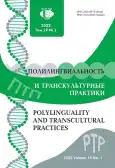Linguistic Manifestations of Extremism in the Aspect of National Legislation of the Russian Federation and the Republic of Belarus
- Authors: Dziadzinkin A.L.1
-
Affiliations:
- International University «MITSO»
- Issue: Vol 19, No 1 (2022)
- Pages: 86-97
- Section: Language Processes
- URL: https://journal-vniispk.ru/2618-897X/article/view/326782
- DOI: https://doi.org/10.22363/2618-897X-2022-19-1-86-97
- ID: 326782
Cite item
Full Text
Abstract
In the context of globalization of society, information becomes not just the sum of knowledge necessary for mankind, but a means of manipulating the consciousness of millions of people, a way of inciting hatred and enmity. Verbal crimes are committed against both human rights and freedoms and against the peace and security of mankind. In recent years, both in Russia and in Belarus, verbal offenses of an extremist nature have become more frequent. For the Belarusian and Russian linguistic and legal discourse, this is a fairly new phenomenon, the interest in which predetermined the purpose of this study - to study the phenomenon of verbal extremism in the aspect of the national legislation of the Russian Federation and the Republic of Belarus. The factual data were conflictogenic texts with extremist focus that were analyzed from a legal standpoint (Article 130 of the Criminal Code of the Republic of Belarus and Articles 280 and 282 of the Criminal Code of the Russian Federation). The methodology of the research comprises the method of parametrization and logical-linguistic, comparative and lexicalsemantic analyses. The object of the research is verbal expressions of extremism. In this study, attention was paid to both the theoretical study of the phenomenon of verbal extremism and the practical analysis of conflictogenic texts. Common signs of verbal extremism are: abstractness, heightened emotional background of transmitted information, pseudo-non-involvement of a person in its dissemination. The main mechanism of sowing (inciting) discord is the use of expressions stating the superiority or exclusiveness of the dominant group as compared to the biological, social or moral defectiveness or depravity of the subgroup. The verbal mechanism of sowing (inciting) hatred is creation of defective or hostile images of the subgroup, when its members are attributed either a desire to lead parasitic lifestyles at the expense of the members of the dominant group, or they are accused of innate hostility to the dominant group and conspiring its destruction. The results obtained indicate that the Belarusian and Russian legislation reflects a similar understanding of the category of verbal extremism, which indicates the gradual harmonization of the legislative systems of Russia and Belarus in terms of assessing crimes against the peace and security of mankind.
About the authors
Aliaksandr Leonidovich Dziadzinkin
International University «MITSO»
Author for correspondence.
Email: alexanderdedinkin@yandex.by
ORCID iD: 0000-0003-1029-0788
PhD., Director of Branch
bldg. 8A, M. Shagal Str., Vitebsk, 210015, Republic of BelarusReferences
- Maslova, V.A. 2021. Тhrough the Synergetic Union of Linguistics and Other Sciences — to New Challenges and Directions. RUDN Journal of Language Studies, Semiotics and Semantics 12(3): 823—847. doi: 10.22363/2313-2299-2021-12-3-823 (In Russ.)
- Lavitski, A.A. 2019. The Russian language legal discourse: offences сommitted verbally. Russian Language Studies 17(3): 300—314. doi: 10.22363/2618-8163-2019-17-3-300-314 (In Russ.)
- Gromova, N.S. 2017. Verbal extremism: on the question of the boundaries of the term. Bulletin of KSU 3: 211—214. Print. (In Russ.)
- Maslova, V.A., Lavitski, A.A. 2019. Political and Judicial Power: Transfer of Ideas and Terms. Political Linguistics. No. 6 (78). P. 189—196. doi: 10.26170/pl19-06-24
- Grushihina, V.A. 2016. K voprosu o problemah vyjavlenija verbal’nogo (slovesnogo) jekstremizma putem ispol’zovanija special’nyh znani. Sovremennost’ v tvorchestve talantlivoj molodezhi. Vol. 17. Irkutsk: FGKOU VO VSI MVD RF publ. Print. Pp. 46—50. Print. (In Russ.)
- Galjashina, E.I. 2006. Linguistics vs extremism: to help judges, investigators, experts / Ed. prof. M.V. Gorbanevsky. Moscow: Juridicheskij Mir Publ. Print. (In Russ.)
- Mokrecova, V.M. 2018. “Rasprostranenie verbal’nogo jekstremizma v informacionnom prostranstve kak ugroza formirovanija sovremennoj lichnosti”. In V International Scientific Forum “An integrative approach to the prevention of addictions among youth in the context of digitalization”]. T.T. Shchelina (Editor-in-chief). Rostov, Dec., 6—7, 2018. Rostov-n/D: JuFU publ. Pp. 94—113. Print. (In Russ.)
- Osadchij, M.A. 2019. Russkij jazyk v sudebnom processe. Moscow: URSS publ. Print. (In Russ.)
Supplementary files









